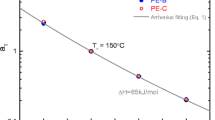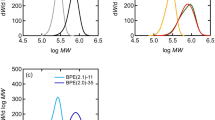Summary
The elongational viscosity of low density polyethylenes depends on the mechanical history as is demonstrated on the samples IUPAC A and IUPAC C and some other specimens. IUPAC C which stems from the same batch as IUPAC A but has undergone an additional extrusion shows a significantly lower elongational viscosity whereas the shear viscosity remains nearly unchanged. The elastic behaviour measured by the recoverable strain is not influenced by a mechanical pretreatment. The viscosity decrease is found to be canceled to its greatest extent after dissolving the sample in xylene and evaporating the solvent. Pure elongation seems to be more effective in creating the viscosity decrease than pure shear. A similar effect could not be found for linear polyethylene and polystyrene. This result leads to the assumption that the branched molecules give rise to a mechanically induced change of the entanglement structure which can be reverted by dissolving. The evidence of the elongational behaviour for film blowing is discussed.
Zusammenfassung
Die Dehnviskosität von Polyäthylenen niedriger Dichte hängt von der mechanischen Vorgeschichte ab, wie an den Proben IUPAC A und IUPAC C und einigen anderen Produkten gezeigt wird. IUPAC C, das aus der gleichen Charge wie IUPAC A stammt, aber einer zusätzlichen Extrusion unterworfen wurde, zeigt eine deutlich niedrigere Dehnviskosität, während die Scherviskosität nahezu unverändert bleibt. Das über die reversible Dehnung gemessene elastische Verhalten wird durch eine mechanische Vorbehandlung nicht beeinflußt. Die Viskositätsabnahme kann nahezu vollständig rückgängig gemacht werden durch Auflösen der Probe in Xylol. Dehnung scheint eine effektivere Viskositätsabnahme zu bewirken als Scherung. Ähnliche Effekte einer mechanischen Vorgeschichte konnten für lineares Polyethylen und Polystyrol nicht gefunden werden. Dieses Ergebnis legt die Annahme nahe, daß die Verzweigungen zu einer mechanisch induzierten Veränderung der Verhakungsstruktur führen können, die reversibel ist. Die Bedeutung des Dehnverhaltens für das Fohenblasen wird diskutiert.
Similar content being viewed by others
References
Rokudai, M., J. Appl. Polym. Sci.23, 463 (1979).
Rokudai, M., S. Mihara, T. Fujiki, J. Appl. Polym. Sci.23, 3289 (1979).
Prichard, J. H., K. F. Wissbrun, J. Appl. Polym. Sci.13, 233 (1969).
Rokudai, M., T. Fujiki, J. Appl. Polym. Sci.23, 3295 (1979).
Meissner, J., Pure Appl. Chem.42, 553 (1975).
Münstedt, H., J. Rheol.23, (4), 421 (1979).
Laun, H. M., H. Münstedt, Rheol. Acta17, 415 (1978).
Laun, H. M., J. Meissner, Rheol. Acta19, 60 (1980).
Münstedt, H., J. Rheol.24 (6), 847 (1980).
Münstedt, H., H. M. Laun, Rheol. Acta20, 211 (1981).
Illers, K. H., Coll. Polym. Sci.259, 955 (1981).
Author information
Authors and Affiliations
Additional information
Dedicated to Professor Dr. Reif on the occasion of his 60th birthday.
Rights and permissions
About this article
Cite this article
Münstedt, H. The influence of various deformation histories on elongational properties of low density polyethylene. Colloid & Polymer Sci 259, 966–972 (1981). https://doi.org/10.1007/BF01558607
Received:
Issue Date:
DOI: https://doi.org/10.1007/BF01558607




